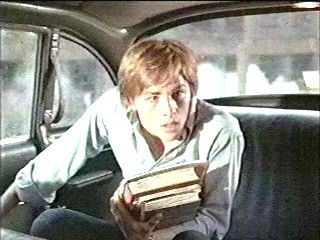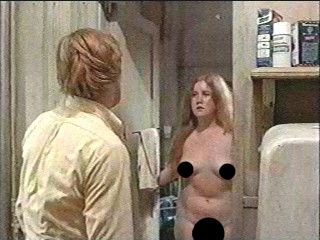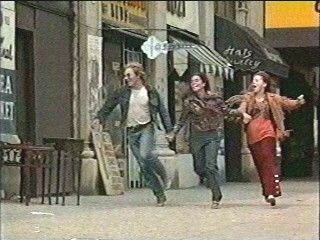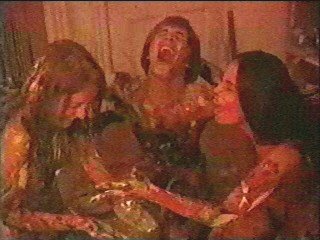
|
|
|
|
|
|
|
|
|
|
| |
|
(1969) Director: Leonard
Horn
For the past few decades a number of film buffs and writers on films have discussed just why MGM - the undisputed king in the Golden Age of Hollywood - somehow managed to fall apart in about two decades or so. There have been a number of theories put forth over the years (check out the long but very entertaining 3-part MGM: When The Lion Roars documentary), many of which do have more than a likelihood of explaining Leo's near-death. A personal theory of mine, which may not be one of the main causes but possibly a significant contributing factor, centers around how MGM reacted to the changing American culture starting not long after the Second World War - or to be more precise, didn't react. Looking at MGM's output from that point on, one can see that until not that long ago that MGM usually had a big reluctance to make movies that were more or less simply "fun" movies, or geared for the newly arrived youth market. Often if they made something "fun", it had some "cod liver oil" in it (It's good for you!), like Forbidden Planet, and such movies usually didn't do well. (At least when first released.) When they become desperate for money and started to make "fun" movies for a supposedly easy buck, the results were almost always embarrassing. For example, in their lowest period (circa 1980 to 1995), their efforts at slasher movies resulted in He Knows You're Alone and A Stranger Is Watching, and their attempt to exploit the martial arts craze included Forced Vengeance and Gymkata. (*) Actually, MGM's embarrassments started much earlier
than the Reagan years. When rival studios like American-International
were having Unlike many counterculture films of the era, this one actually takes place in the eastern U.S., in New York City. Don Johnson plays the title character (no, not the "Magic Garden" - he plays Stanley Sweetheart) a youth in his early 20s who is attending college, making underground films on the side, though film does not appear to be his major. When outside of class and not cooped up in his apartment, he spends his time wandering around the city or dropping into clubs, though staying on the sidelines. One day he meets Barbara (Gillen). He goes up to her apartment and they have sex. Stanley wanders around some more. Then it's another day. He meets a prudish girl names Cathy (Dianne Hull) in his language class and they start dating. She won't have sex with him, though. Stanley goes for a walk. At a cafe, the actor who played the killer Santa Claus in Christmas Evil (a.k.a. You Better Watch Out) makes a gay pass towards him, and a frightened Stanley runs into the night. Stanley lounges in his apartment. He then meets Andrea (Victoria Racimo) and Danny (Greer). Hi, how are you? Fine. See you later. Wander, wander, wander. Stanley is bored (big surprise), even when Cathy one
day suddenly changes her tune Lesbians aside, The Magic Garden Of Stanley Sweetheart is an utter bore of a movie. Though the description of the movie certainly sounds like it's the key culprit for the yawns that are generated, I would say the screenplay actually isn't the prime factor to point a finger at. What really sinks the movie is the character of Stanley Sweetheart. Sure, the movie may more or less be a hodgepodge of vignettes, but if Stanley had been given some kind of solid character, he might have actually made these vignettes interesting by actually giving some kind of honest reaction - likable or not - to them. Instead, things are often the other way around, where Stanley's personality seems dictated by whatever situation he is thrust into. Shoved into an isolated and lonely part of the city, he acts like a puppy that's been kicked around a lot. Dropped into a counterculture version of a rave party, he becomes a dancing coke-sniffing fiend. Handed a sweet girlfriend, at first he acts shy and a non-conformist. But then when she breaks up with him he becomes a swearing abusive lout. Stanley has virtually nothing of himself to make any kind of personality, one of the few things being that he likes to masturbate in the bathtub while reading letters from his mother. Even without knowing that this was Don Johnson's first
movie, it's fairly evident from his performance that he is still an
amateur at the acting game. Though Johnson's amateurism is a liability, most of the blame for his poor performance actually rests on the shoulders of director Leonard Horn. It was his responsibility to do retakes if Johnson stumbled, as well as to guide Johnson as to how to bring Stanley Sweetheart to life. But there's no evidence Horn was working with Johnson on this, as if he just let Johnson do whatever he felt was right. No wonder Johnson seems confused about how to act. For example, among the few things we learn about Stanley is that the "magic garden" in the title is the special place in his mind where he daydreams he has confidence, peace, etc. The scenes where we do get to see his daydreams are so short, that Johnson hardly get to do a thing. Not only that, it's sometimes hard to figure out if a particular scene is a daydream or not. It gets even worse; though the title of the movie suggests that Stanley's fantasy world plays a major role, it's actually only touched upon a few times in the first part of the movie, then it's completely dropped and never brought up again. Horn's seeming refusal to insert any kind of constant
thread, or even a relative coherence just further proves that he was
not the right person to handle such an avant-garde project, whether
it's bad editing that abruptly cuts to another scene before the
previous one has had a reasonable conclusion, or with efforts to be
cutting-edge or "hip" that come across as forced (repeated footage,
montages with narration, etc.) These failed efforts come not only from
his As silly as the songs get, they do at least provide a
lot of the one factor that prevents Stanley Sweetheart from
being absolutely worthless, and that is humor - mostly of an
unintentional kind, though. There is some genuine comic relief, such as
when we see Stanley's film Head-Less, a hilarious and dead-on
parody of typically pretentious student films. But most of the movie is
played dead serious, and though Stanley and his drug-influenced buddies
occasionally do or say something worth a smirk or or chuckle, they are
otherwise really boring people that don't seem to have any future.
After a while, you have to ask yourself just why you are watching
something so downbeat as uninteresting characters who just don't seem
to care about their futures or anything else. The funny thing I've kept
noticing about counterculture movies is that even though they were
aimed at the youth of the time, they constantly depicted youth in a a
downbeat light. You have to wonder why anyone would turn into a hippie
or tune in and drop out. Maybe that's why the youth of the time didn't
want to listen to anyone over 30, so they wouldn't have to risk someone
with a straight mind and experience telling them straight out how
unrewarding their lifestyle was. * To further illustrate MGM's desperateness during this period, I only need to point out that for several years they got the rights to distribute Menahem Golan and Yoram Globus' Cannon films. And to show that MGM still has some desperateness, a few years ago they got the rights to distribute the entire Cannon library! Check
for availability on Amazon. See also: Breezy, Didn't You Hear, Your Three Minutes Are Up |
 great success making
movies for the youth in the baby boom era, MGM jumped in and made an
ass of itself. Sure, they made Jailhouse Rock, but the
subsequent Elvis movies made in the '60s were thoughtless efforts
cranked out with a fattening yet fading star belting out forgettable
songs like Song Of The Shrimp. A few years later down the road,
when rival studios were capturing the youth with counterculture movies
like Easy Rider, MGM jumped into the act, though their
efforts were nowhere as successful. Not only did The Strawberry
Statement and Zabriskie Point generally fail
at their intentions, but time hasn't been very kind to them. However,
they still remain watchable and have their interesting moments, which
is more than you can say about The Magic Garden Of Stanley
Sweetheart. An adaptation of the novel by Robert Westbrook (who
also wrote the screenplay), it's the most obscure of the three. Despite
containing Don Johnson's screen debut, it has never been released on
video, and almost never gets any air time on cable. Watching it, it
doesn't take long to figure out why; it's an absolute mess of
half-baked ideas that's so pointless and unfocused, I think I can
safely say that even the drug-influenced youth of its day must have let
out a collective "Huh?" over it.
great success making
movies for the youth in the baby boom era, MGM jumped in and made an
ass of itself. Sure, they made Jailhouse Rock, but the
subsequent Elvis movies made in the '60s were thoughtless efforts
cranked out with a fattening yet fading star belting out forgettable
songs like Song Of The Shrimp. A few years later down the road,
when rival studios were capturing the youth with counterculture movies
like Easy Rider, MGM jumped into the act, though their
efforts were nowhere as successful. Not only did The Strawberry
Statement and Zabriskie Point generally fail
at their intentions, but time hasn't been very kind to them. However,
they still remain watchable and have their interesting moments, which
is more than you can say about The Magic Garden Of Stanley
Sweetheart. An adaptation of the novel by Robert Westbrook (who
also wrote the screenplay), it's the most obscure of the three. Despite
containing Don Johnson's screen debut, it has never been released on
video, and almost never gets any air time on cable. Watching it, it
doesn't take long to figure out why; it's an absolute mess of
half-baked ideas that's so pointless and unfocused, I think I can
safely say that even the drug-influenced youth of its day must have let
out a collective "Huh?" over it. and asks him for sex.
They have sex. Stanley decides to make another film. Not long
afterwards, he starts having an affair with Cathy's roommate. Not only
is Stanley boring, he's a jerk. Stanley quits school for no apparent
reason. He starts snorting coke, though he's so pathetic at this that
he can't even have an interesting drug trip. He wakes up after his
"wild" night, picks up his jacket, and leaves the premises. Not long
afterwards, Cathy breaks up with him. Stanley starts to fall apart,
though considering his life before all of this, there really is no
difference. Then... well, you can see there's no real story happening
here. But is there a point to all of this mishmash we have seen? Well,
after watching to the very end, it seems that the moral of the story is
that if you act like a jerk, start doing drugs, drop out of school and
do other things to royally f*ck up your life, you'll end up living with
and boinking two lesbians. Some moral, but hey... LESBIANS! Bet
that woke you up as much as me seeing them on my TV screen, and they at
least made the last few minutes of the movie actually tolerable to
watch.
and asks him for sex.
They have sex. Stanley decides to make another film. Not long
afterwards, he starts having an affair with Cathy's roommate. Not only
is Stanley boring, he's a jerk. Stanley quits school for no apparent
reason. He starts snorting coke, though he's so pathetic at this that
he can't even have an interesting drug trip. He wakes up after his
"wild" night, picks up his jacket, and leaves the premises. Not long
afterwards, Cathy breaks up with him. Stanley starts to fall apart,
though considering his life before all of this, there really is no
difference. Then... well, you can see there's no real story happening
here. But is there a point to all of this mishmash we have seen? Well,
after watching to the very end, it seems that the moral of the story is
that if you act like a jerk, start doing drugs, drop out of school and
do other things to royally f*ck up your life, you'll end up living with
and boinking two lesbians. Some moral, but hey... LESBIANS! Bet
that woke you up as much as me seeing them on my TV screen, and they at
least made the last few minutes of the movie actually tolerable to
watch. He often seems ill
at ease in whatever situation he's in, though at least that puts some
emotion in his amazingly bland and expressionless face. (That problem
disappears when his character starts to grow a beard late in the movie,
which may explain why Johnson has often appeared unshaven in his
subsequent roles.) Johnson is okay when he plays his part as a loner
(especially when he has little to no dialogue), but otherwise his
performance usually has a note of uncertainty in it, as if he hadn't
rehearsed long enough to gain any confidence. When not stumbling over
his dialogue, he manages to be schizophrenic in his delivery, abruptly
changing the tone of his character midway through scenes by changing
the inflection of his dialogue.
He often seems ill
at ease in whatever situation he's in, though at least that puts some
emotion in his amazingly bland and expressionless face. (That problem
disappears when his character starts to grow a beard late in the movie,
which may explain why Johnson has often appeared unshaven in his
subsequent roles.) Johnson is okay when he plays his part as a loner
(especially when he has little to no dialogue), but otherwise his
performance usually has a note of uncertainty in it, as if he hadn't
rehearsed long enough to gain any confidence. When not stumbling over
his dialogue, he manages to be schizophrenic in his delivery, abruptly
changing the tone of his character midway through scenes by changing
the inflection of his dialogue.  directional technique, but in
attempts to insert the elements commonly associated with movies of the
time that pandered to the college crowd. The scenes of sex and
full-frontal nudity (including Johnson) indeed must have been shocking
at the time and seemingly an honest reflection of the lifestyle of many
college youths of the time. But seen today after thirty years of
progressively more permissive cinema, the shock value has been stripped
away to reveal that all these scenes had were shock value; now
these characters are just stepping naked in front of the camera not
because that's how they are, but simply because they are able to.
Though I can't say to be an expert of the era, just about everything
that's more or less claimed to be a cultural element of the times rings
false, even the soundtrack. While The Strawberry Statement and
Zabriskie Point were flawed, they at least
had great songs on their soundtracks that were indeed what the youth of
the time were listening to. Though Stanley Sweetheart trots
out Magic Mountain and So Happy Together, the rest of
the soundtrack mostly consists of unknown songs that are either
forgettable or downright laughable (Sample lyrics of psychedelic song:
"Water! / Rushing down! / Think I'm gonna drown!")
directional technique, but in
attempts to insert the elements commonly associated with movies of the
time that pandered to the college crowd. The scenes of sex and
full-frontal nudity (including Johnson) indeed must have been shocking
at the time and seemingly an honest reflection of the lifestyle of many
college youths of the time. But seen today after thirty years of
progressively more permissive cinema, the shock value has been stripped
away to reveal that all these scenes had were shock value; now
these characters are just stepping naked in front of the camera not
because that's how they are, but simply because they are able to.
Though I can't say to be an expert of the era, just about everything
that's more or less claimed to be a cultural element of the times rings
false, even the soundtrack. While The Strawberry Statement and
Zabriskie Point were flawed, they at least
had great songs on their soundtracks that were indeed what the youth of
the time were listening to. Though Stanley Sweetheart trots
out Magic Mountain and So Happy Together, the rest of
the soundtrack mostly consists of unknown songs that are either
forgettable or downright laughable (Sample lyrics of psychedelic song:
"Water! / Rushing down! / Think I'm gonna drown!")